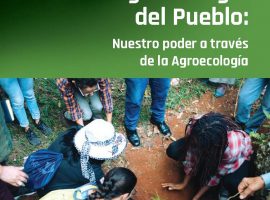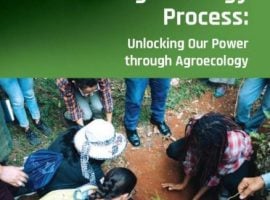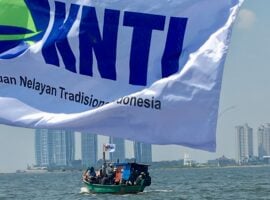Last November, a delegation comprised of U.S. based grassroots organization attended an encounter organized by the National Association of Small Farmers (ANAP) Asociación Nacional de Agricultores Pequeños, a member of the global social movement La Via Campesina, in the Havana Province in Cuba. The convening organization was the Cuba U.S. Agroecology Network– “a loose network of institutions and individuals from the U.S. who gather to show support and solidarity to the agroecology movement in Cuba, to help build bridges between people and institutions working on agroecology in our two countries, to create spaces for learning and exchange, and to channel resources and opportunities to partners on the island.”
In 2019, the biennial conference included Black farmers who have been implementing Agroecology practices, and other climate conscious and ancestral practices in farming. One of those farmers is brandon king, a culture worker, cooperative developer, and current board member of Cooperative Jackson in Jackson Mississippi. Brandon attended the gathering and shared his reflections with WhyHunger. The interview was lightly edited for publication.
What made you decide to take the trip to Cuba and what were your first impressions?
I’ve been wanting to go to Cuba for a long time and was on a call with the Climate Justice Alliance working group and heard about this trip. Cuba had been in my mind as an idea of socialism in practice.
I felt like I learned a lot in Cuba, I didn’t see any house-less people. I didn’t see anybody panhandling, if you were to get swindled, it would be by someone who has a job (haha). Everyone had housing and everyone had food and that’s more than we could say for the U.S. Empire.
I thought it was interesting, in terms of the race, it’s more so that we are all Cuban, like Cuban nationalists versus separating between Afro-Cuban and Cubans who have white ancestry. That was a bit difficult for me to digest, even being conscious and aware that race and racism is constructed differently in different places.
However, one thing I did notice is that a lot of the people who held high positions with ANAP and that wing of the government were lighter complexion, male people. There weren’t a lot of [Black farmers] and I think a lot of [Black] folks live on the coast and there’s a difference between resources that go into the city and resources trickle down and trickle out and you could see that the [farming] coops that are around the city, around Havana, are more developed and supported.
What are the farming coops?
They have two different kinds, one is the kind that the peasants came together and the government formed a coop where they share the land. The other is individual families that have it kind of coop style. I didn’t see many Black people who had the latter style.
Why do you think that was?
Well, hearing and learning about Che [Guevera] and Fidel Castro, how Che used to call Black people monkeys and how [African Traditional Religions] Santeria and Yoruba traditions were outlawed in Cuba. But also how being queer or being gay or LGBT was outlawed and criminalized in Cuba. These are examples of the contradictions Cuba has been and are still working through. It takes time but there still is a revolutionary spirit that I know on that land. I think Raul Castro’s daughter is very pro-LGBTQ and has helped Cuba to change their policy and stance on the LGBTQ community, which I think is very positive.
Were there other contradictions you felt?
With ANAP, there’s a defensiveness when asking serious questions about [race and identity]. I felt this from the [organizers] and probably rightfully so. We come from the empire, like who are you? I felt like I got my answer in their response but I think folks were afraid to address things related to race and gender directly.
I asked one of the farmers about the differences between the two coops, the one with the peasants coming together and the one that was family-owned, and then one of the ANAP representatives stepped in and diverted the question. It was very awkward. I thought that I was not going to ask any of those types of questions anymore, because it’s not welcomed. I decided to focus on how they are providing food for the community, for the schools and how they’re doing it in a sustainable way, all of those things I was able to learn just from visiting the farms. It was welcome knowledge that I was able to get and I feel some questions were answered in what wasn’t said.
What were the questions that weren’t answered?
Where the Black people at? That was the question that I had, and I asked that among our cohort. They asked us what three questions we had and mine was Black people, adonde?
[On the question of gender identity] there was one person in particular from ANAP, because Spanish language is very gendered, and they would change chicas and chicos to chices to be gender neutral. I thought that was a sign that we hear you, and I thought that was cool. But on a structural tip, I’m not sure how high that goes up in ANAP.
I also had questions about the embargo, and I didn’t ask because I knew it wouldn’t be received well. One thing they were saying about the [original] embargo with the U.S. is that it was a blessing in disguise because it forced Cuba to figure out how to feed its people. Not like they eat super well though. I’m vegan and I was eating a lot of starch. I paused my veganism to make sure I still had nutrition in my body. But they still figured out how to feed their people.
I had a question around if the embargo is lifted, how that keeps Cuba on a revolutionary path. I feel like [involvement with the U.S. means] you’re more embedded in a capitalist market. So what does that mean for Cuban people and what is the goal of removing the embargo for them?
The embargo is really messed up because anyone that’s messing with the U.S. can’t trade with Cuba and vice versa. That kind of cripples them in a way. If the embargo is lifted how does Cuba keep its revolutionists aims and goals and objectives?
What lessons have you taken back and what lessons you would like to offer (farmer to farmer)?
I take back the understanding that the government could do a lot just to make sure that farmers are supported and have the resources that they need in order to build things in sustainable ways. I think it’s unfortunate that the U.S. government doesn’t prioritize farming in that way, it’s farming based upon making profits, instead of meeting the needs of people. I take back their robust infrastructure just to actually do that, I thought that was really impressive.
Campesinso to Campaesino, learning about different farming techniques, learning about remediating the soil, processing and distribution all of those things are really helpful.
They had a book and I’m trying to translate it into English. It’s about campesino to campesino ideology principles around organizing and farming—like start small, start slow anything that happens too fast probably is not going to last. It was refreshing to hear that the farmers were moving slow and this is like from 1956, all the way to now. That was really helpful for me to hear and that is what I’ll take back to black farmers in the states.
Cuban is going to have its share of contradictions, every place does, but I would say, just be encouraged that there is a revolutionary spirit among the people and the folks that are doing the farming on the ground and there is a sense of sharing and a sense of community that I hadn’t experienced anywhere. Everywhere we went they filled our bellies and they made sure that we were taken care of and were comfortable. Even with the language barriers, they were very aware of how we were doing. They wanted to make sure we had the best time possible.
Ok, but you didn’t say what you would like to offer to them…(haha) Is there anything else you’d like to share?
There were a couple of Black farmers we were able to talk to and there was this sugar cane plantation, a couple of the Black delegates went to the field and picked some of the sugar cane and left some tobacco. We were able to talk to one of the farmers just about being Black and enslavement, and what does that mean for African people in Cuba, what does that mean for African people on the continent. The guy we talked to, he shared was we are the same people, we share the same lineage, and we are very strong and resilient people. That was very comforting to hear because I didn’t hear any dichotomy about race from the representatives, but to speak to Black farmers there, we saw each other, and that was really cool to see, I would impart that wisdom they shared with me.





